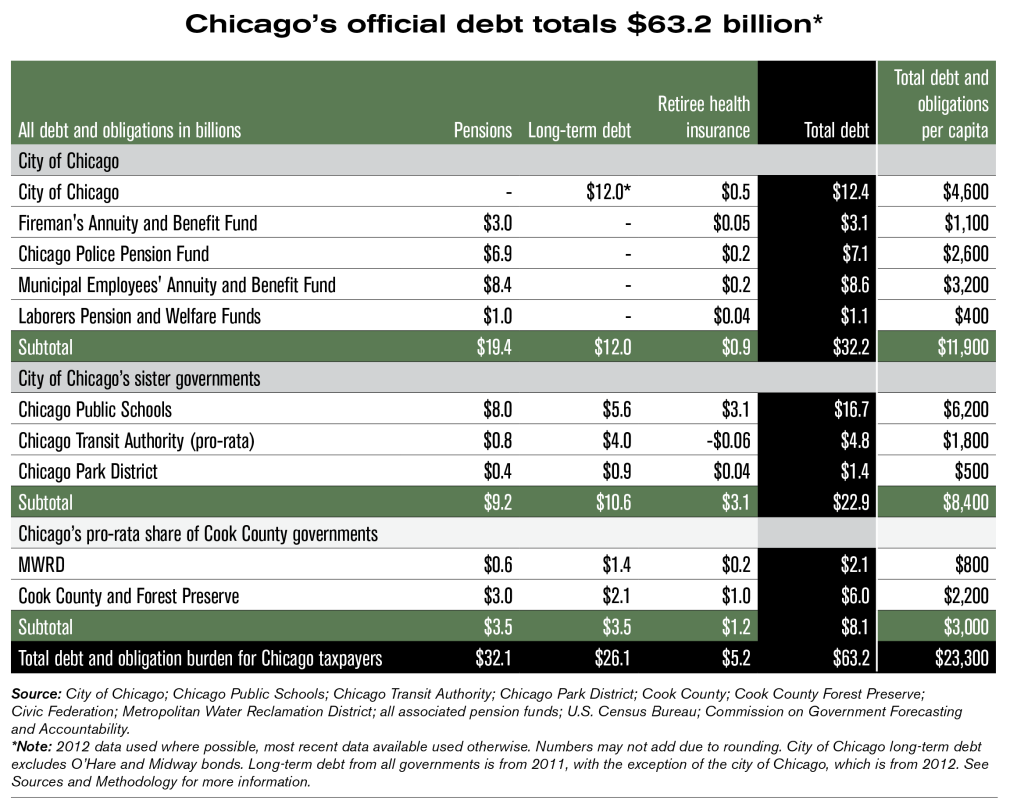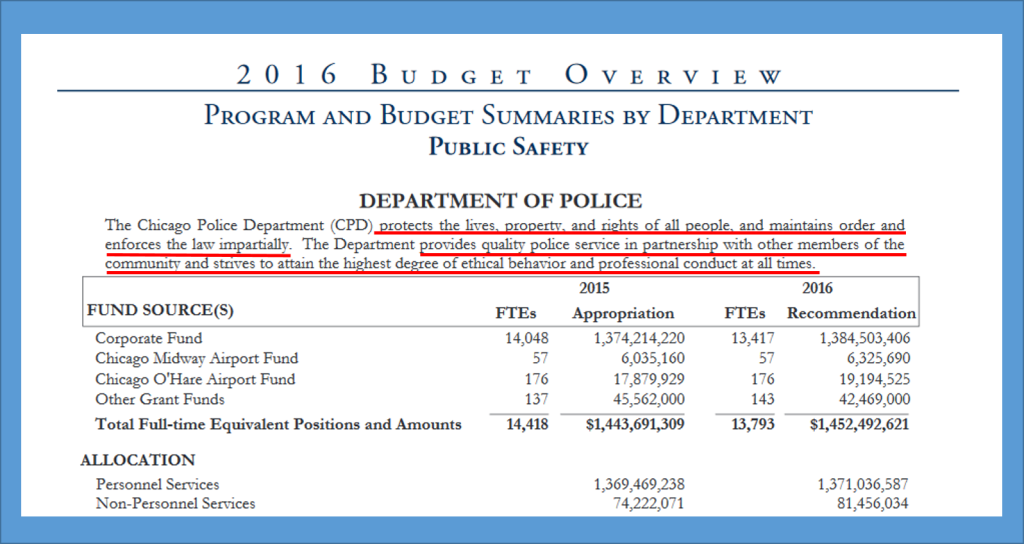According to an article in Crain’s Chicago, “Chicago has paid about $662 million on police misconduct since 2004, including judgments, settlements and outside legal fees, according to city records.”

That’s over a half-billion dollars in approximately 12 years, that we know of. And we don’t know how much is currently pending and what happened before 2004.
According to Illinois Policy, the city is currently $63 billion in pension debt.
Here’s the 2016 Budget for the Chicago Police Department.
Did you read the summary of the department: protects the lives, property and rights of all people…enforces the law impartially…in partnership with other members of the community…highest degree of ethical behavior and professional conduct? This is a farce on all levels.
I digressed.
Can Firing Bad Officers Help Reduce the City’s Pension Crisis?
Let’s do a little math. I know this may be simplistic in nature, but hey, let’s look at it anyway.
City pension deficit = $63 billion
Money paid for police misconduct = $6.6 million over a 12-year period, which is nearly 10 percent of the current pension deficit.
I did not research the number of police officers that were responsible for misconduct and are still working, but I did look at the City of Chicago Data Portal for salary information. Many seasoned officers earn between $70,000 – $90,000 per year. In 2014, Jason Van Dyke, the office accused of shooting Laquan McDonald, earned $78,000 a year, according to the Better Government Associations payroll database.
Scenario
10 officers charged with misconduct earn $70,000 per year = $700,000.
10 officers working 10 years for $70,000 a year = 7,000,000.
Cost of benefits and perks per year = $30,000
Benefits and perks over of period of 10 for 10 year: $30,000 x 10 years = $300,000
Multiply that by 10 years = 3,000,000
There are several unknowns, but here are two that come to mind:
- How much the city contributes to the pensions of the officers;
- How much the city is paying in salaries and retirement benefits for former staffers that were bad employees but are still receiving benefits.
Base on these figures, at least $10,000,000 per year could be saved on salaries and benefits by firing police officers responsible for misconduct. Certainly this could help with the city’s pension crisis, directly and indirectly.
What Do You Think?
Can firing bad cops help reduce the city’s pension crisis?
What other ways can money be saved and possibly allocated to the city’s pension?



I agree that the officers should be fired but it won’t save money in the way you mentioned it. The problem is that you then have to hire more officers to replace the ones you get rid of, so you might save some money if the officer was a long term veteran but probably not all that much.
What is definitely needed is more sensitivity training and more oversight, probably a couple of citizens review boards because of the size of the city (not sure if you have that or not) and 3-month reviews of each officer to better monitor what they’re doing and how. That might cost a bit more money up front but in the long run it would reduce the lawsuits and save lots of money there.
You’re right. It does cost more to hire and train new employees, so there may not be savings here.
As I read your other recommendations, which are great by the way, this will not be an area of savings unless the whole system is revamped. And even if the system was changed, the underlying culture will remain….nope, no savings there.
I don’t know if sensitivity training would help in a city where coppers are probably trained to treat non-white people differently from white ones. It would be a good PR move but I don’t think it would work here, not even with the new top cop.
Citizen review boards would be great if the decisions wouldn’t be ignored or overridden by Mayor Emanuel and other city staff members who disagree with the decision or the process. Would the members of these board be paid?
The reviews would probably work if time and impartial third-party and member of CPD staff are available to do them. Like you said, money would have to be spent in order for this to work
I have a question, though.
Jon Burge, the ex-cop who tortured several victims and served time for a non-related crime, is still getting his pension of $4,000 a month, which is nearly $50,000 a year. If there are at least 10 more bad officers still getting nearly $50,000 per year, costing $500,000 per year, do you think stopping these payments could help reduce the city’s pension crisis if the funds are diverted to the pension budget?
That I would agree with. No way they should still be receiving pensions after that kind of bad behavior. I figure it must be a union thing, so they’re probably not allowed to do it.